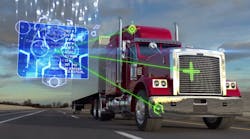How the power of location intelligence delivers value to fleet owners
Managing a fleet is a tall order regardless of size. Any misstep can result in headaches, inefficiencies and lost productivity across the supply chain.
Thanks to advances in sensor technology, it’s now possible for anything and everything to be tracked — including fleets such as trucks, trailers and goods on trailers. Sensor technology gives fleet owners access to massive amounts of data that can streamline delivery, improve driver safety, enable supply chain visibility and ensure efficient fleet management.
But note, it’s what is done with this robust data that will either catapult your business to success or stop you in your tracks. Put another way, the data is only useful if you gain actionable insights that enable you to increase efficiency and productivity.
So, how can fleet managers ensure that they are leveraging data to optimize value for customers and their organization? By tapping into the power of location intelligence.
Let’s consider three examples of how location intelligence can help you improve business processes and make more informed decisions.
1. Streamlining delivery
In today’s age of instant gratification and high expectations from consumers and enterprise customers, it is crucial to streamline delivery in order to provide consistent and accurate predicted times of arrival. After all, 40%-50% of the total cost of delivery occurs at the last mile and with that, customer satisfaction.
As such, logistics providers are hungry for new technologies and processes that will improve last-mile delivery, ensure on-time delivery and enhance customer satisfaction.
Location intelligence, combined with real-time traffic information, gives an essential and comprehensive picture of current road conditions that will impact truck-specific directions and arrival times.
This instant insight helps customers optimize their route planning in advance by taking into account how traffic flows on a selected roadway at a given point in the day. Knowing the precise locations of your vehicles on the road and their destinations, combined with real-time traffic and roadway information, enables highly accurate delivery times.
2. Improved driver safety
Driver safety and driver satisfaction is a major factor when it comes to managing risk. Experts predict the driver shortage will continue, so retention of safe and experienced drivers is more important than ever. Having the ability to monitor driver behavior and measure compliance with road-use regulations is vital to limiting potential liability and cost of operations.
Location intelligence provides you with the information needed to efficiently coach your drivers. It powers dynamic applications that show real-time data such as split-lane traffic information, traffic safety alerts and weather information, ultimately allowing drivers to make better and safer decisions along their drive. It’s this rich, real-time location data that can make the difference between driver behavior that results in a costly accident and a careful, successful driver.
Location intelligence is the critical piece for these applications that enable you as a fleet manager to analyze your drivers’ behavior in real-time and post-drive. With location intelligence, you can identify drivers that meet your company’s standards and provide incentives for better drivers to stay with your company.
3. Efficient fleet management
More than ever, fleet managers are looking to gain more detailed visibility into operations, better manage their fleet and maximize the utilization of assets.
Technology is providing fleet managers with even more rich and intelligent location data about the vehicles in their care. Because the majority of a vehicle's operating costs are tied directly to the vehicle and how it runs, this data is invaluable as fleet managers try to focus on efficiency.
Truck platooning is an upcoming opportunity to reduce the single biggest cost for trucking fleets: fuel consumption. At its core, platooning is primarily focused on technology that provides components such as adaptive cruise control, blind spot warning, GPS, forward collision warning and lane-keep assist.
Location intelligence has the power to impact every business metric. As a fleet manager, it is your job to oversee all fleet performance and vehicle maintenance in order to increase productivity and to help your business run as smoothly as possible. By leveraging location intelligence, you can optimize fleet efficiency, help reduce operational costs, and deliver superior value to your customers.



